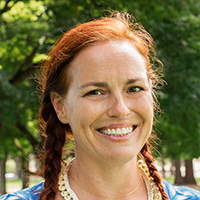
Mari-Vaughn Johnson
Dr. Mari-Vaughn Johnson was previously an agronomist with the US Department of Agriculture’s Natural Resources Conservation Service in Temple, Texas. She brings a systems-oriented perspective, informed by her experiences in international diplomacy, multi-functional land-use solutions, and policy impact assessments. She originally trained in plant ecology and wildlife sciences, earning an MS in environmental and plant biology at Ohio University and later a PhD in wildlife science at Texas A&M University. Between degrees, she volunteered as an intern with the USGS Biological Resource Division’s Palila Restoration Project on Hawai‘i Island, conducting floristic surveys of invasive, endemic, and naturalized species. In 2010, Mari-Vaughn became a AAAS Fellow and put this team-building strategy into effect. She worked with the US State Department, leading the Lower Mekong Initiative and creating the Friends of the Lower Mekong. In this position, she formed multi-lateral relationships across multiple disciplines, coordinating between the federal agency, foreign governments, domestic and foreign academic institutions, and multi-national foundations, all with the goal of bringing science to policy more effectively. The experience also helped to hone her ability to work with diverse stakeholder interests and negotiate cross-discipline solutions. Mari-Vaughn provided scientific expertise to inform the Great Lakes Water Quality Agreement, an international agreement between the US and Canada. She also served as co-chair of the Global Young Academy, where she worked internationally to promote science-based solutions to local, regional, and global challenges including those of poverty, clean water access, biodiversity, and agriculture. Her most recent position at the USDA focused on the Conservation Effects Assessment Project (CEAP), providing leadership and direction in funding of research related to wildlife, wetlands, and agricultural conservation practices by developing collaborative science portfolios that addressed stakeholder concerns related to sustainable agricultural production systems and water quality at regional and national scales.

